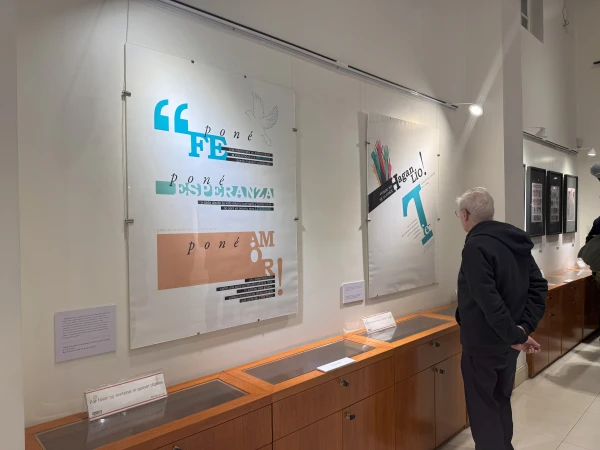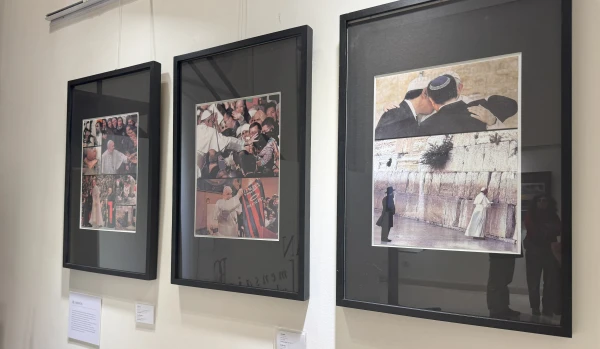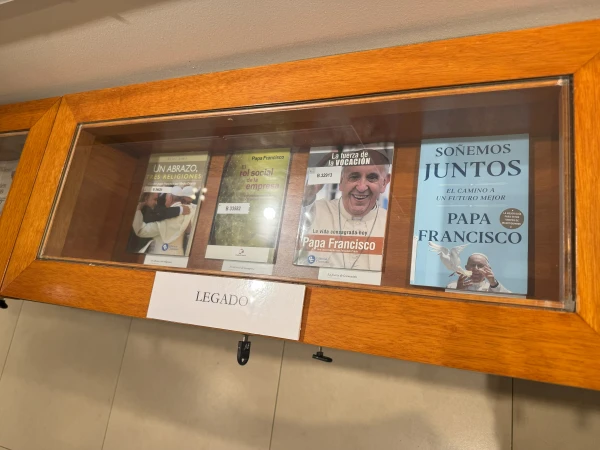“Francisco, Legado and Message” is the title and the idea that gave rise to a collaborative sample carried out by the Library of the Argentine Nation Congress, with the support of the Organization of Ibero -American States (OEI), and which aims to keep alive the memory of the Argentine Pope, whose figure transcends the time to turn it into a reference not only religious but also social, political and, above all, humanist.
The exhibition was presented this Wednesday, August 27 at the OEI headquarters, with the exhibition of a small part of the material gathered by the library: photographs, books written by Francisco and other authors who dedicated works to his life and trajectory, journalistic cuts, and some of his most remembered phrases.
Receive the main news of ACI Press by WhatsApp and Telegram
It is increasingly difficult to see Catholic news on social networks. Subscribe to our free channels today:
Being a collaborative collection, the call to the community is open, so that the individuals make their contribution of books, publications, letters, cuts, magazines, objects and other documents that can help reconstruct the figure of Pope Francis to maintain their legacy.
This instance, explain from the Library“It represents a fundamental link with the Argentine people, where the Holy Father was born, formed and began his social and humanitarian work that would mark his pontificate.”
Once selected and classified, these materials will be available for consultation and dissemination.

The most universal Argentine
When presenting the exhibition, Luis Scasso, director of OEI Argentina, acknowledged that it is a “very particular” sample, because “we do not know if it is a sample, if it is a cultural activity, if it has a religious content, if it has a social content, or if it is all that together, as Francisco was, as was the Pope”.
“This is a fraction, really very small, of the work that the library is doing and his team collecting the documentary collection on the life, the trajectory of Jorge Bergoglio, Pope Francis, surely the most universal Argentine and the most universal of Argentines,” he considered, especially recalling his insistence on the need to “build bridges” in such a fragmented and violent world.
“At this point of life, work and tour, you realize when you are before, as we popularly say – a different one. And Francisco was really a different,” he said.
Francisco, “an extraordinary reader” of the signs of the times
The deputy of the nation Humberto Ruggero took the floor to remember the teaching received from the Jesuits about the importance of “understanding the times of history, knowing how to read the signs of the times, and not the signs of the times we live, but the times that will come.”
“Francisco was an extraordinary reader about the times that came to our country, to humanity. That is why his legacy is so important,” he said, describing him as “a contemporary monumental of current humanism.”
“Francisco, in addition to his faith and religion, and his creed and his agreement with the other religions in the search for consensus, was a fundamental humanist in the new times of humanity,” he said, encouraging to value him because “it was the voice of those who were not heard, it was the voice of humanity, it was the voice of many without voice.”

Finally, he pointed out “one thing that the world and our country need is to find the culture of consensus and the culture of the agreements.”
“Francisco knew that the world and future society are not built on the confrontation, destruction and death, or the denigration of citizens; they are built in positive creation, in the transcendent agreements that do not contemplate sectoral needs, but have as its object a word that went out of style, but not because of validity, which is the common good.”
“The most important thing about Francisco is his legacy, and the obligation that we have many is to project Francisco’s legacy, project that in the future because what he marked were the new times and signs of the history of man. Let’s claim Francisco in his thoughts, his legacy and his imagination of the future of us,” he concluded.
A collection of all Argentines
Alejandro Santa, general coordinating director of the Library of the Nation Congress, explained the foundations of this exhibition, pointing out a problem that exists in Argentina with the great men and women of history: “The legacy is forgotten.”
And in Francisco’s particular case, he stopped in “the legacy of the phone call to Sundays, the legacy of the letter to the person who had a bad time, the message he gave personally.”
“And beyond the more than 650 copies that we already have in the collection that we created in the library for four months, where there are books, newspapers, people (who) wrote about him … What we open to citizens is the possibility that they give their letters, that audio they have with Francisco, the object they shared with Francisco, so that this collection that we created in the library is of all Argentines,” he encouraged.

“There is no doubt that it is the most important Argentine we had in our history. And we wanted, somehow, to leave the message in this collection,” he summarized.
“They are invited, as always, to our library, so that they come to see the collection, so that they can tour an institution (…) that is open from 8 in the morning until 24 hours, with their services absolutely for the service of the people. But particularly, in difficult times, we have the obligation to be able to provide people who do not have access to the possibility of a book, to a show, that is our obligation and in that we are.
Natalia Martínez is part of the library team that worked in the assembly of the sample, and explained that the conceptual axis chosen was the humanistic dimension, because “humanism is what crosses the Pope in all his facets.”
“It seemed that a graphic sample was what was going to represent the most. Especially because of the material we had of the collection that the library has and that we would allow us to show each stage of the Pope,” reflected in four instances of the sample: beginnings, assumption, mission and legacy.
The exhibition has a bibliography that accompanies each of the instances and a selection of its most outstanding phrases, taken from the most recognized speeches of Pope Francis.
Before any query and to make a donation to this collection, an email can be sent to dpt@bcn.gob.arto the Directorate of Technical Processes of the Library of Congress.
It is also possible to approach from Monday to Friday to the BCN cultural space, located in Alsina 1835, City of Buenos Aires.

